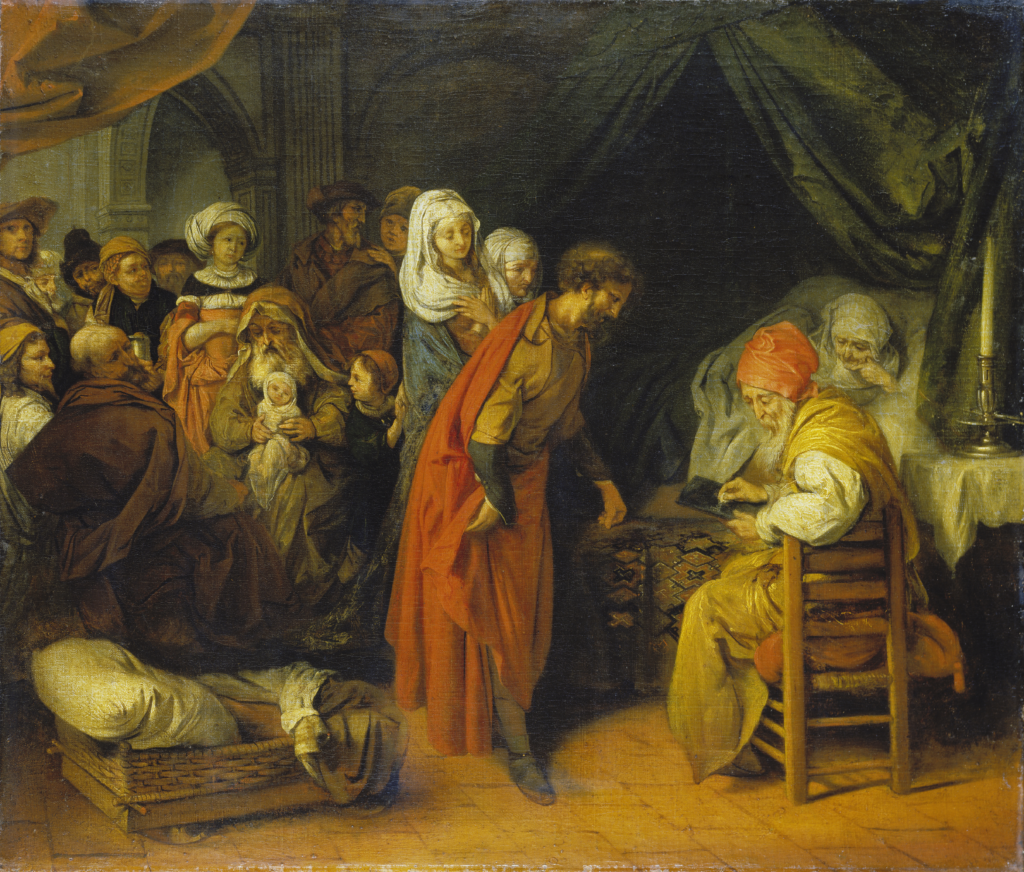Shakespeare’s famous question in Romeo and Juliet (“What’s in a name?”) was a bit of a paradox: “a rose by any other name would smell as sweet.” It would, but it doesn’t mean names are irrelevant – as nominalists of every age may think. Words, as building blocks of language, convey meanings. Absent shared meaning, language breaks down.
In other words, names are not just private affairs.
Especially in the Judeo-Christian world.
Today, January 3, is the feast of the Holy Name of Jesus. The celebration originated towards the end of the 1400s, jockeying for a place in the liturgical calendar during the first week of January, since Jesus was named at His circumcision on the eighth day after His birth. After its brief disappearance following the 1969 Roman Calendar Reform, the feast returned in the 2002 revision of the Roman Missal as an optional memorial on this day.
Names are not just conventions, contemporary naming practices influenced by secular criteria notwithstanding. It’s not just that how we confer names today is at variance with religious practice (though it is); it’s at odds with near universal human practice.
From both Biblical and longer traditional bases, a name expresses something of the essence of a person. It both creates and reveals an identity. And, in the Bible, names are given, not taken, because identity is revealed in relationship, not self-will. The one who names has a relationship to and some measure of authority over the named.
That is why God changes names in the Bible: Abram becomes Abraham, Jacob becomes Israel, and Simon becomes Peter. “I have called you by name; you are mine” (Is 43:1) does not mean God encounters an identity that He then calls. The text begins clearly, “the Lord who created you / He who formed you.” You are who you are, your identity is what it is because of God’s creative work, not your decision. “Before I formed you in the womb, I knew you” (Jer 1:5) does not mean God knew an anonymous, identity-less, amorphous being.
Even relationships vis-à-vis another that are not as absolute as God’s are no less real in terms of naming. Joseph names his adoptive Son Jesus, because he is so instructed by God’s angel. And the boy Jesus is “obedient” to Mary and Joseph, including in His Name. Zechariah names John out of obedience to God’s angel and, by that act, his temporary muteness is overcome to sing God’s praises about “you, my child.” Adam calls his wife Eve, the “mother of all the living.”

Biblical names are also tied to relationships. Those assembled to celebrate John’s circumcision initially dissent from his name because “no one among your relatives” bore it. Jesus almost certainly walked the Israel of his day as Yeshua ben Josef” (Jesus, son of Joseph). That identification-by-relation continues across cultures, from the Russian tradition of the patronymic (used in terms of familiar friendship, e.g., “Ivan Ivanovich”) to the general European practice of identifying a person usually by some variation of “John Smith, son of John and Mary (née Jones) Smith.”
All this is to say that human history has generally recognized that a name and an identity are not self-creations, but come from relationships, ultimately with God but mediated with parents. Catholics, believing in the Communion of Saints, traditionally reinforced this concept by giving a child a patron: no Tatum or Khalessi, and certainly not Freya, would have shown up in earlier times at a Christian baptismal font.
I make these observations in light of certain contemporary trends connected with gender ideology. As a side battle in the contemporary pronouns war, some school districts have established policies whereby a child may be called by another name in school without parental consent or even knowledge. Teachers who inform parents, in violation of this reverse “don’t ask, don’t tell” policy have been fired, a federal court even opining such practices do not “shock the conscience.”
Well, they do shock mine and should any parent’s conscience who thinks schools act in loco parentis, not parents in loco scholae.
A name and identity come from relationship, and no homeroom teacher whose contact with my child for twenty minutes a day for a year should dare tamper with the name I gave my child.
Virginia Governor Glenn Youngkin has proposed changes to state education rules that would prohibit any concealment from parents of substitute “identities” and would bar the use of another name for a child absent legal proof of a name change. That regulation has generated outrage among the usual suspects, boards of education threatening to fight in court for their usurpation of parental rights.
No society to date has considered a person’s identity to be purely a self-creation, especially in opposition to that person’s family. No society has deemed a name an utterly fluid and personal construction that can be altered at will. There is a reason a name change requires, even in secular societies, an established public and legal process.
Contemporary Polish philosopher Zbigniew Stawrowski has identified today’s cultural crisis as internal to the West: an ersatz culture that fastens upon traditional words (like “rights” and “freedom”) while totally unmooring them from their received meanings – understandings gained from Athens, Rome, and Jerusalem. Our woke culture does this in order to feign continuity while, in fact, radically undermining those meanings to express something virtually the opposite of what they have signified in our longstanding cultural traditions.
*Image: Birth and Naming of St. John the Baptist by Barent Fabritius, c. 1660s [Städel, Frankfurt, Germany]
You may also enjoy:
Benedict XVI’s The Icon of Holy Saturday
Fr. Bevil Bramwell’s This is Holy Ground














